It is a myth that soft skills should not be included on a resume. While it may be a waste of space to include a long list in the skills section, your work experience and summary sections should hint at a wealth of behavioural skills. How do you get things done with other people? We all do things differently. These are the resume soft skills that your future employer would like to hear about.
But what exactly are soft skills and how do you incorporate them in your resume? In this blog, we’ll cover everything you need to know including:
- The difference between hard and soft skills
- The best places to include soft skills for resume
- The most important soft skills employers are seeking
- List of soft skills examples for resume
- Different groups of soft skills
They are not acquired through education or training - your career story should show a progression of increasing proficiency. Which soft skills are most important for your resume?
Many recent studies have demonstrated the importance of resume soft skills in today’s job market. According to LinkedIn’s 2019 Global Talent Trends report, 92 percent of hiring managers agree that strong soft skills are increasingly important. A study reported by SHRM, an organization for HR professionals, found that almost half of executives thought a lack of soft skills was the biggest proficiency gap in the U.S. workforce.
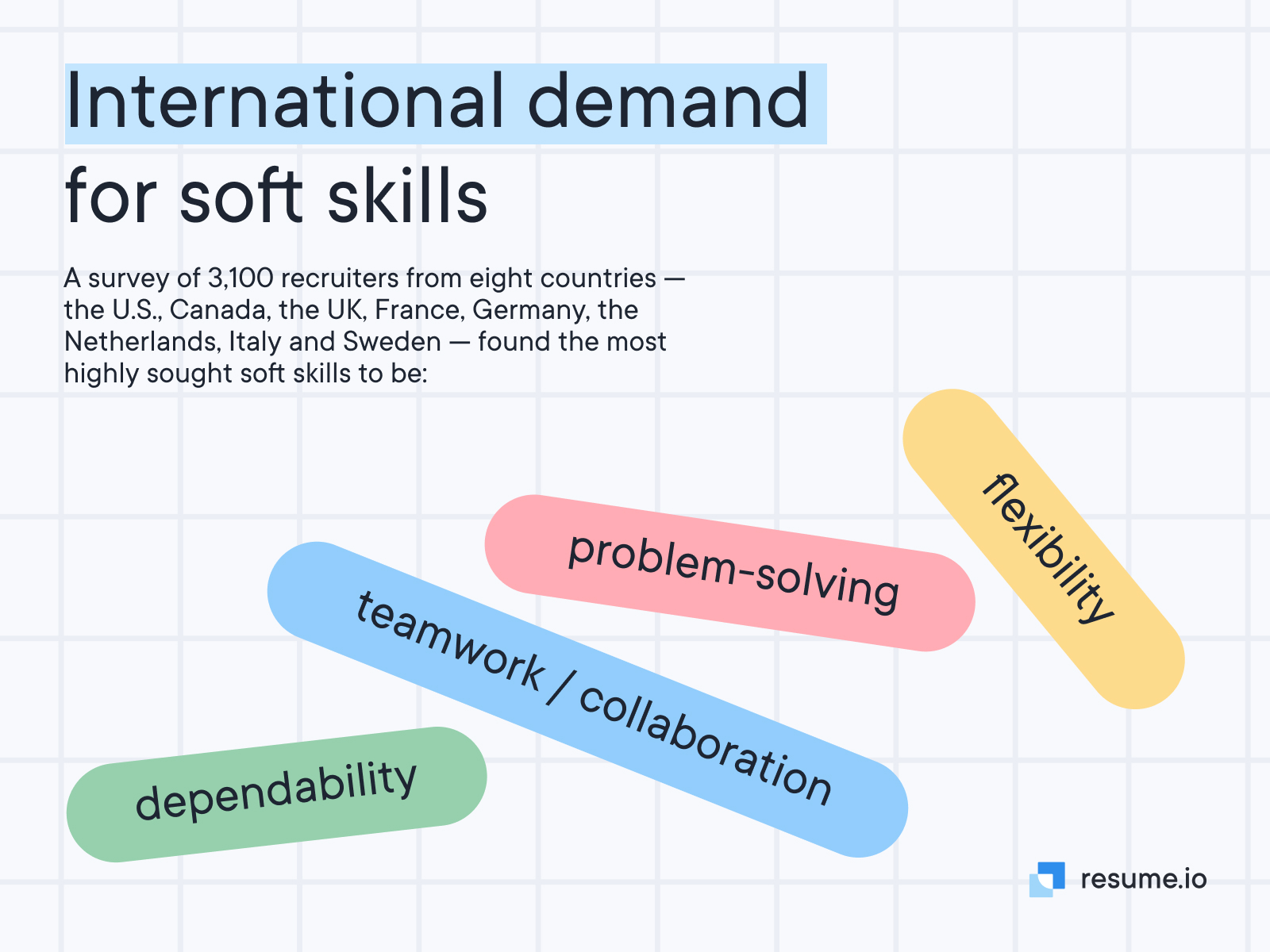
What are soft skills?
Soft skills are personal traits that affect how you behave and perform in the workplace. The most common examples of resume soft skills are communication skills, time management, attention to detail, leadership and work ethic.
Soft skills are usually qualities candidates already possess, as opposed to ones that are learned on the job. Employers pay particular attention to soft skills because they can make all the difference when two applicants have similar educational backgrounds or experience levels. While soft skills can only be properly assessed during an interview, your future boss needs to see that you understand which skills are important for success in the role.
Hard vs soft skills - what’s the difference?
Soft skills are often viewed as the opposite of hard skills. While soft skills concern your ability to interact with others and manage your workload, hard skills are much more technical. Software programs, tools and specific industry processes would all fall under the hard skills category. If you need specialized training or a physical object to perform it, it’s almost certainly a hard skill.
| Hard skills | Soft skills |
| Requires specialized knowledge | Quality that you’ve always had or developed through social experience |
| May take years of practice or training to master | Hard to train in people who don’t have it already |
| Often involves a physical object or computer software | Often the “ strengths part” of your answer to “What are my strengths and weaknesses?” |
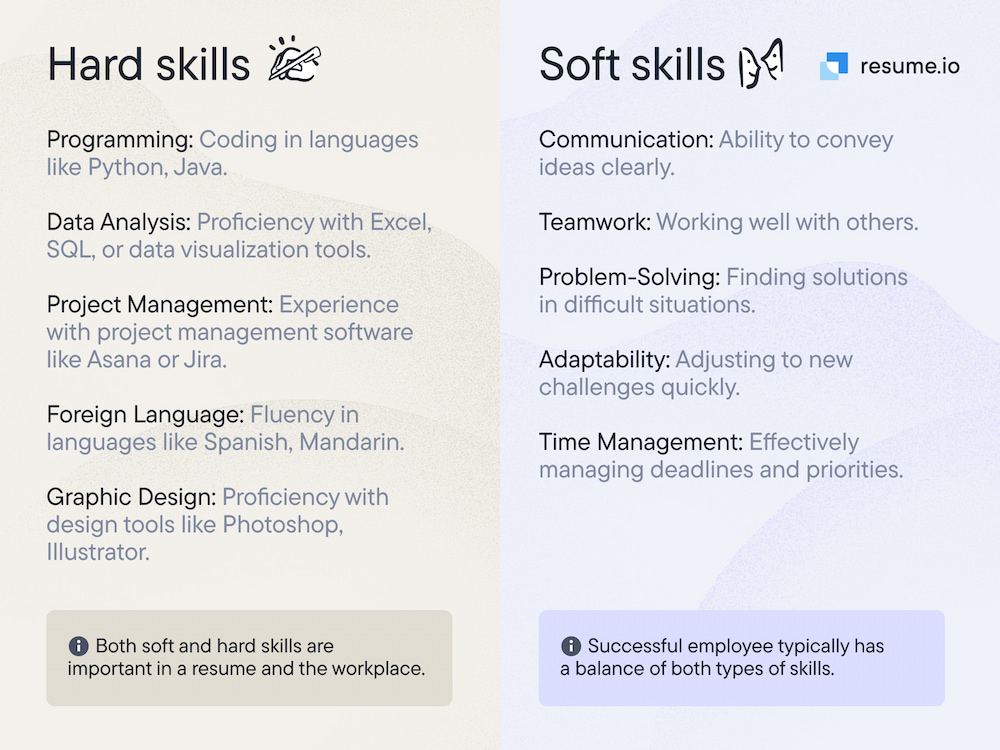
In technical industries, soft skills can’t replace the need for hard skills. For example, a graphic designer who doesn’t know Photoshop likely won’t get hired on their positive attitude alone. However, against several candidates with the same technical abilities, the right resume soft skills can quickly push one applicant to the top of the list.
As technology starts to take over the more mundane activities, resume soft skills have become more important than ever. Very few people will sit in a room on their own without any contact with others to get things done.
Soft skills examples for resumes can include:
- Leadership
- Team management
- Emotional intellect
- Empathy
- Bedside manner (for medical professionals)
- Building customer relationships
- Timely communication
- Dedication
How do you list soft skills on a resume? Well, you don't list them for a start. Not like the list above, at least. You need to integrate your soft skills into the text of your resume, in your summary, your employment history section and only leave a few of the most unique for the skills section. Employers will understand the soft skills that went into an achievement - simply listing them offers no context.
What soft skills should I put on my resume?
The two most important rules for placing soft skills on your resume are: accuracy and relevancy. This means the soft skills you describe should reflect your work experience and/or achievements, as well as be relevant to the job you’re targeting.
The soft skills on your resume largely comes down to two factors: your actual qualities and the job description. Sure, you can Google lists of top soft skills for resumes, but if they’re not true to your experience or not what the company values, then they might not do you any favors.
Your qualities: Start by creating a master list of all the soft skills you possess and would feel comfortable demonstrating in your next position. Above all, your soft skills should be accurate, with examples to back them up. You need to be able to impress with your stories during an interview - you can be sure that an employer will ask about them. Soft skills are tricky to talk about, so only lead with your strongest examples.
The job description: Once you’re comfortable with your own abilities, take another look at the job description to hone in on what your prospective employer values most. Look for similarities between your own list and the soft skills mentioned in the job description. Do some background research on the company to get more information about the workplace culture. Consider the industry as a whole and where your employer fits in the picture. These insights will help you narrow down your master list to the top 5 soft skills you should include on your resume.
Customizing your resume
You’ll notice that the above approach is centered on the job description and company research. That likely means you’ll have to tweak your resume for each position that you apply to. By investing just a few extra minutes to give an employer exactly what they’re looking for, you can sign. You can also use a resume checker to quickly assess how well your resume presents your skills and fits the job description before sending it off.

Where do soft skills go on a CV?
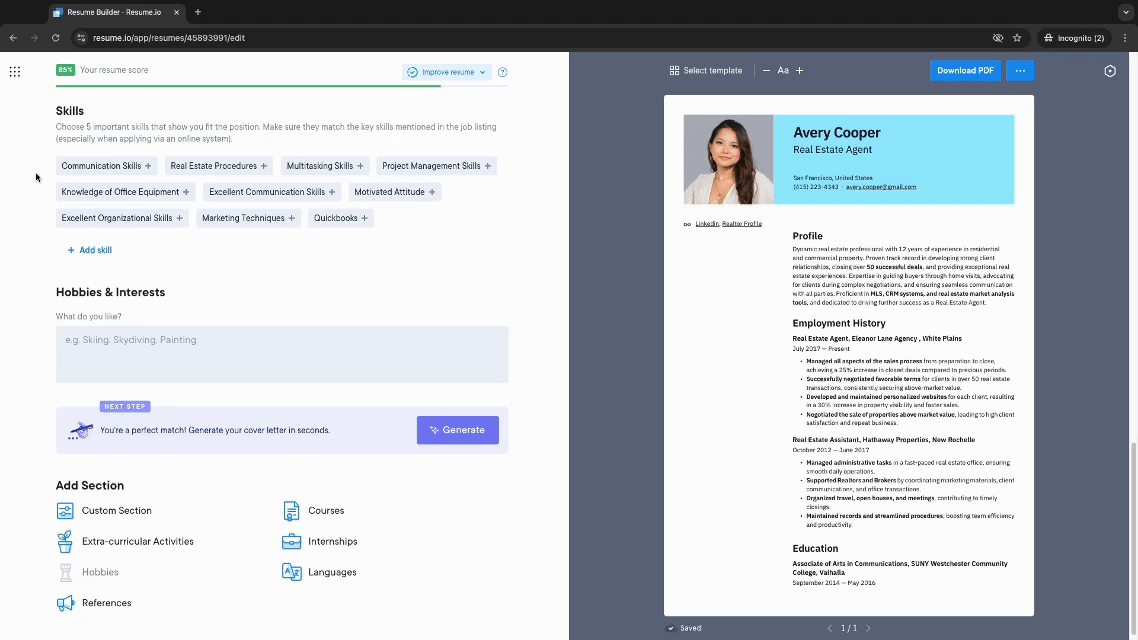
Your first instinct might be to jump straight to the CV’s skills section, but soft skills for your resume will actually need to be placed throughout the document, integrated in nearly every resume section in various ways. This includes placing your skills in the Summary, Employment History and (obviously) your Skills list.
Make sure that you do not go overboard with your resume skills though - accomplishments should always come first.
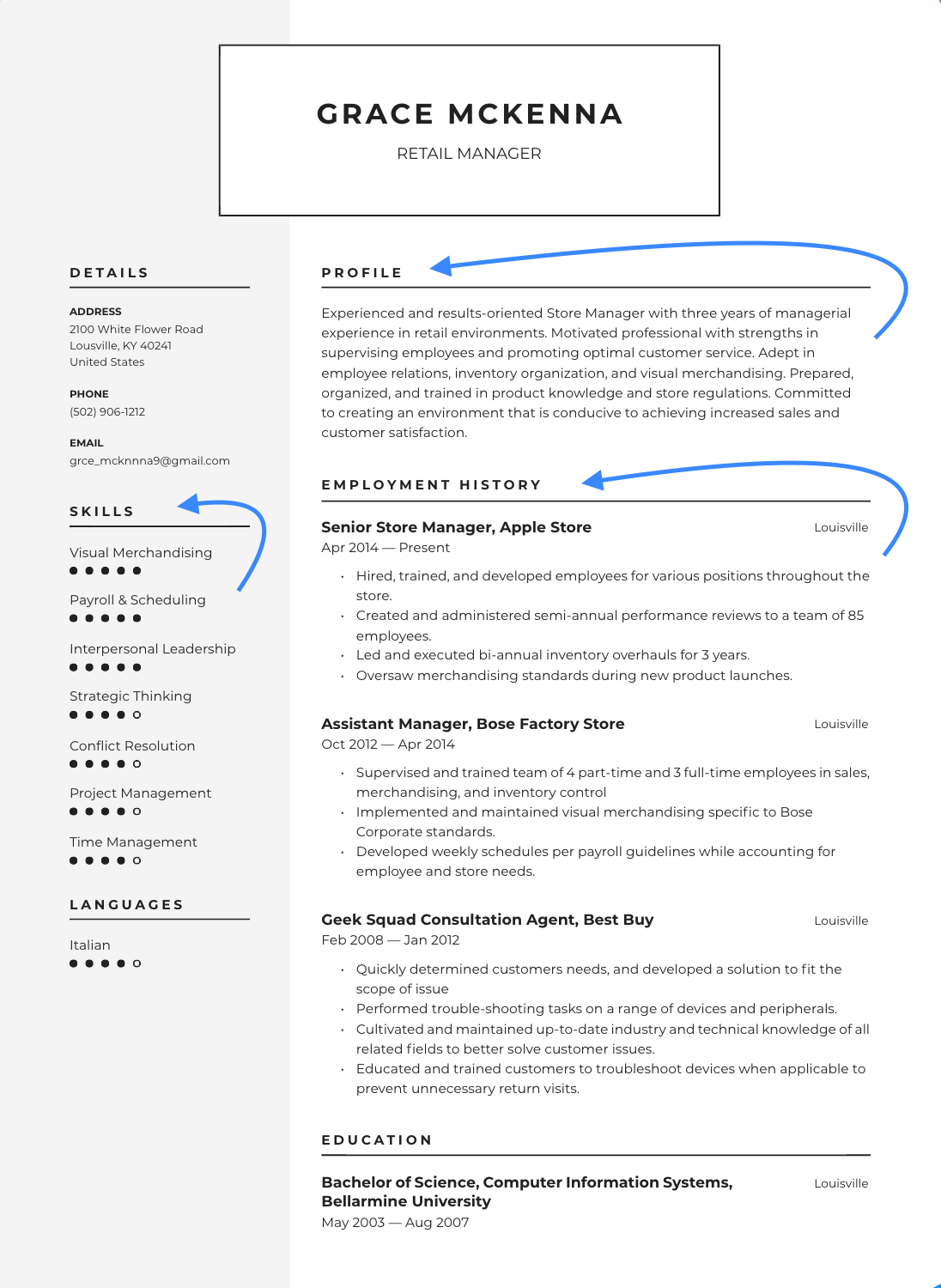
Here is a breakdown of how to include soft skills in three different resume sections:
Summary
In the summary section, also known as a profile or personal statement, your soft skills will likely take the form of personal adjectives. Since the summary is all about grabbing the hiring manager’s attention, make sure to include only the most relevant soft skills, ones that you know the company is looking for.
CV skills example for the summary: Highly organized and outgoing personal assistant with more than 7 years of experience scheduling some of the biggest names in reality television.
Employment History
The most important element of the employment history section is that it gives you the space to back up your soft skills with numbers and details. Just about anyone can write that they have great communication skills, but how can they prove it? Your employment history section is the place to show a hiring manager that your soft skills equal gains for the company.
CV skills example for the employment history: Routinely communicated with more than 30 patients a day in a busy private practice, following up to relay test results in an accurate and timely manner.
Skills Section
While the bullet point nature of the skills section lends itself well to more technical abilities, it would be a mistake to leave off the soft skills entirely. The skills section is a great place for more specific resume soft skills that you weren’t able to expand upon in the employment history section i.e. public speaking, negotiation or mentoring. These abilities can stand on their own, whereas ideas like creativity or communication often benefit from some explanation.
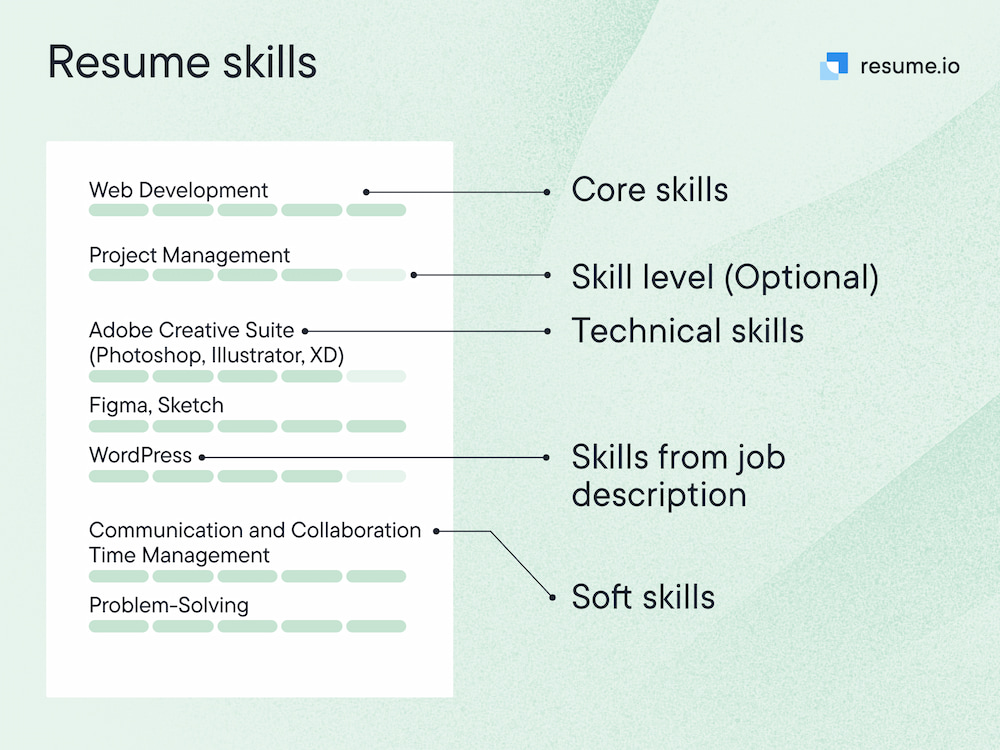
Resume soft skills list example: storytelling, willingness to learn, grant writing, dispute resolution, team management, decision making
What is the most important soft skill? For me, communication has to come at the top of any soft skills list. Very few people work on their own - to get anything done you have to work closely and effectively with others. Great communication means clearer tasks, fewer misunderstandings and increased motivation.
The top 7 soft skills for resumes with examples
Still a little stuck on which soft skills are the best for your resume? Here’s a list of our top 7 soft skills examples for resumes which you can modify for your own needs and experience: collaboration, adaptability, resourcefulness, positive attitude, work ethic, willingness to learn, critical thinking.
Let’s analyze them in detail below and provide some related soft skills for each one.
1. Collaboration
Collaboration is a great catch-all term for several abilities related to working with others. This soft skill implies that you actively listen to your teammates and work with them towards a common goal. It also means that sometimes you might step up to lead, but you also know how to follow instructions when that’s what’s called for. Here are some other soft skills for resume related to collaboration:
- Interpersonal skills
- Teamwork
- Leadership
- Empathy
- Conflict resolution
- Public speaking
- Tolerance
- Communication
- Trust building
- Cultural sensitivity
- Active listening
- Feedback
"I worked with an extended project team in five functional groups to deliver on the 18-month critical path. We finished 3 months ahead of target and beat our first quarter sales targets by 43%"
2. Adaptability
If 2020 and 2021 taught us anything, it’s that situations can change almost in an instant. Knowing how to adapt and be flexible when new challenges arise is one of the most important traits employers are looking for. This is even more true when it comes to applying for entry-level service jobs like barista or sales associate, where scheduling can change weekly. Here is a list of resume soft skills related to adaptability:
- Flexibility
- Follows instructions
- Improves based on feedback
- Stress management
- Can adapt to working independently
- Resilience
- Learning agility
- Self-motivation
- Openmindedness
"The nature of my role changed by 80% after the merger. I was working with different people on entirely different projects, but I thoroughly enjoyed learning a new skill set and was promoted within a year."
3. Resourcefulness
Related to adaptability, resourcefulness is your ability to make the most of what you have and find creative solutions when new problems arise. Many innovative companies are looking for candidates who aren’t just rote machines but who can bring new approaches to difficult situations. Here are some soft skills examples for resume related to resourcefulness:
- Works well under pressure
- Creative thinking
- Troubleshooting
- Problem-solving
- Innovative solutions
- Organization
- Problem identification
- Risk management
- Critical thinking
- Prioritization
"I created a new on-boarding system for call center staff that meant there were 30% fewer mistakes in the first month and employee retention improved by 25% after a year."
4. Positive attitude
It’s a soft skill as old as time, yet having a positive attitude is just as important as ever. Showing off the ways in which you are pleasant to work with can go a long way in creating a great first impression of yourself. Here is a list of soft skills for resume related to positive attitude:
- Charismatic
- Outgoing
- Friendly
- Welcoming
- Patient
- Motivating
- Inspires others
- Gratitude
- Humility
- Constructive communication
- Kindness
- Mindfulness
"I believe that every problem should be met with a positive attitude - writing award-winning code for a FinTech service does not happen from a place of "this can't be done" negativity.
5. Work ethic
In certain sectors, the ability to come in early and stay late is practically a requirement. Work ethic is all about your commitment to the job and the effort you put in to bring the company results. If you need to prove your interest, soft skills examples for resume relating to work ethic might be your best bet:
- Motivated
- Physical or mental stamina
- Perform effectively in a deadline environment
- Positive work ethic
- Determined
- Focused
- Concentration
- Accountability
- Initiative
- Continuous learning
- Discipline
- Reliability
"I worked until 10pm at night for a week to ensure that the software rollout proceeded without a hitch, being contactable 24/7 for global users throughout the training period. We achieved 96% coverage within four weeks."
6. Willingness to learn
For students, interns and entry-level applicants, a desire to learn new things is one of the most important soft skills to convey on your resume. You’ll likely be facing other candidates with the same education background or hard skills, so being able to prove your commitment to growing in the field is key. Here is a list of soft skills related to willingness to learn:
- Active listener
- Ability to follow instructions
- Accepts feedback well
- Self-awareness
- Professionalism
- Willingness to try new things
- Curiosity
- Growth mindset
- Reflection
- Information gathering
- Self-directed learning
"I had never delivered a personal development session before, let alone written training materials, so I worked closely with the L&D team to develop my skills and ensure the content was fit for purpose."
7. Critical thinking
Competition is fierce, so companies are on the lookout for candidates with bright ideas on how to do things better and differently. If your employer values a smart approach, soft skills related to critical thinking are a must. Check out these soft skills examples for resume:
- Efficiency
- Strategic planning
- Artistic ability
- Scheduling
- Negotiation
- Critical observation
- Workflow management
- Implementing change
- Data interpretation
- Problem analysis
- Risk assessment
- Hypothesis testing
- Systematic thinking
- Contextual understanding
"I created an entirely different order process that allowed for oversight by internal and external stakeholders and reduced order discrepancies by 32%, saving $130k in the process."
Can you put soft skills on a resume? Yes, after having read this blog, you might not believe that anyone would think this, but there is a school of thought that says that a resume should be a factual and technical document, devoid of behavioral elements. That is utter rubbish. Our behavior at work has a direct impact on our productivity, so soft skills are an integral part of any amazing resume. Is your resume soft enough?
Different groups of soft skills
It is possible to think of soft skills in different ways. They can come in various families.
1. Transferable skills
Transferable skills can be soft or hard, but it is the soft transferable skills that an employer are truly interested in. Hard skills can be taught, but soft skills that have been learned at a previous employer are ready to go once you join your new company. Bad habits are hard to break, but good habits will immediately radiate through your new team.
2. Management skills
Rather than think of soft skills individually, consider which types of soft skills would help you in a management situation. If the hiring manager is asking you about how you manage those around you (both sideways and downwards), pick a few examples of your soft skills that demonstrate your proficiency.
3. In-demand skills
It is useful to go into any interview with an idea of which soft skills will be most valued by each specific employer. Think about their culture and the type of work you will be doing. Which skills will your competition lack? Which stories will you tell to highlight those skills?
Key Takeaways
Possessing the technical skills to do the job means nothing if you are terrible at the softer "people" skills. Soft skills are not something that you can learn in a classroom. They take practice, observation and refining - usually over a period of years - until you can be confident that your impact on others is as good is it could be.
Conveying your soft skills on your resume is a crucial way of whetting a hiring manager's appetite for a deeper conversation at interview. Your hard skills are easy to understand (and often at the same level of many other candidates), so it is your soft skills that will help you to stand out.
- Read the job description and see which soft skills will help with the role.
- Describe your accomplishments so that your soft skills come to the fore.
- Highlight skills where others will struggle to match your proficiency.
- Make sure that you have some compelling stories lined up for the interview.
Follow the advice in this blog and your interview invites will come rolling in.







